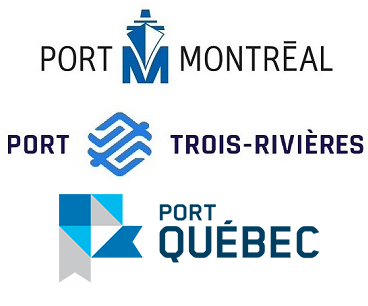
Ports of Montreal, Québec and Trois-Rivières taking the Net-Zero Challenge
Press release
Montreal, May 10, 2023 — The Ports of Montreal, Québec and Trois-Rivières are taking the federal government’s Net-Zero Challenge. The announcement was made by Daniel Dagenais, Vice-President, Port Performance and Sustainable Development of the Montreal Port Authority (MPA), alongside Pascal Raby, Vice-President, Operations of the Québec Port Authority, and Jacques Paquin, Executive Vice-President of the Trois-Rivières Port Authority, as part of Quebec’s marine sector conference, Assises québécoises du secteur maritime 2023, taking place May 9 and 10 at the Lévis Convention Centre.
Launched in August 2022 by the Minister of Environment and Climate Change, the Net-Zero Challenge is a voluntary initiative that invites organizations to develop and implement credible and effective transition plans to make their facilities and operations emission-free by 2050.
By announcing their collective participation in the Net-Zero Challenge, the ports of Montreal, Quebec City and Trois-Rivières are joining forces to accelerate the decarbonization of maritime transport on the St. Lawrence River corridor.
The ports of Montreal, Quebec City and Trois-Rivières signed a cooperation agreement in 2022 covering various aspects, including communications, innovation, the environment, marine operations and asset management. This shared commitment to the Net-Zero Challenge is a tangible example of promising projects set in motion to develop a strong shipping corridor from a sustainable development perspective.
Operated by the Montreal Port Authority (MPA), the Port of Montreal is the second largest port in Canada and a diversified transshipment centre that handles all types of goods: containerized and non-containerized cargo, liquid bulk and dry bulk. The only container port in Quebec, it is a destination port served by the largest shipping lines in the world. It is also an intermodal hub with a service offering that is unique in North America, featuring its own rail network directly dockside connected to Canada’s two national rail networks. The MPA also operates a Cruise Terminal and a Port Centre. The MPA factors economic, social and environmental components into its corporate initiatives. This commitment is governed by a sustainable development policy whose guiding principles focus on involvement, cooperation and accountability. Port activity supports 19,000 jobs and generates $2.6 billion in economic benefits annually. As part of the 17 Canadian Port Authorities and active since 1882, the Port of Trois-Rivières offers a wide range of facilities and services to the maritime industry throughout the year. The Port is an important player in regional, national and international economic development for major industrial sectors such as the aluminum industry, forestry and agri-food. The Port of Trois-Rivières accommodates 55,000 trucks, 11,000 railcars and more than 240 merchant and cruise ships annually originating from over 100 different ports in more than 40 countries around the world. It handles 4.3 million metric tonnes of traffic, is responsible for nearly 220 million dollars in economic spin-offs and generates more than 2,000 direct, indirect and induced jobs. The Port of Québec is among Canada’s five largest ports in terms of tonnage handled and economic spinoffs. It is strategically located to serve North America’s industrial and agricultural heartland. Each year, cargo ships from or to some fifty countries call at the Port of Québec to connect the Great Lakes and Midwestern U.S. markets to the rest of the world. Twenty percent of the port’s territory, which extends from Beauport to the South Shore, is dedicated to recreational activities and tourism.About the Port of Montreal
About the Port of Trois-Rivières
About the Port of Québec
— 30 —



